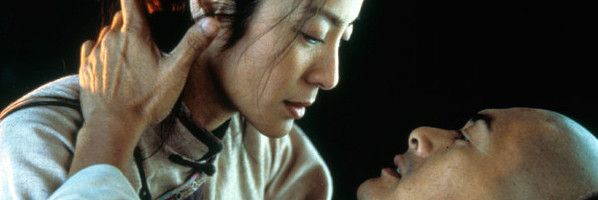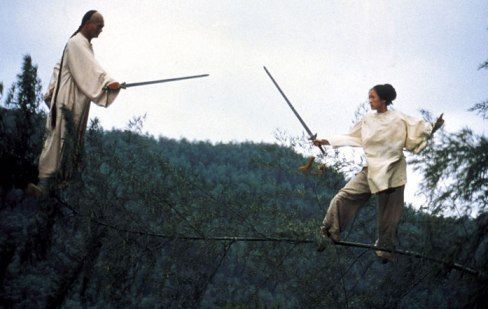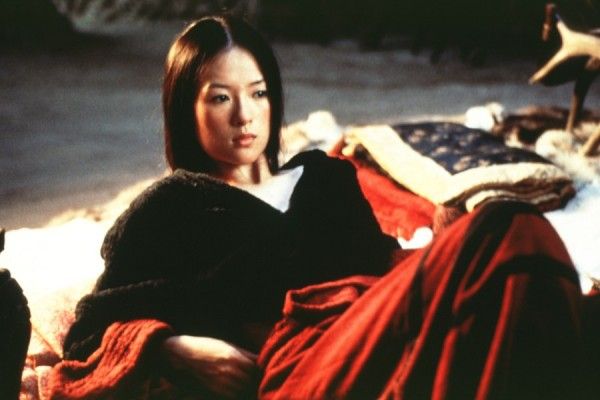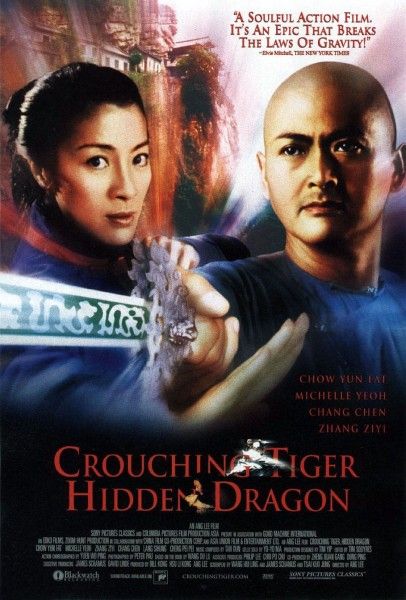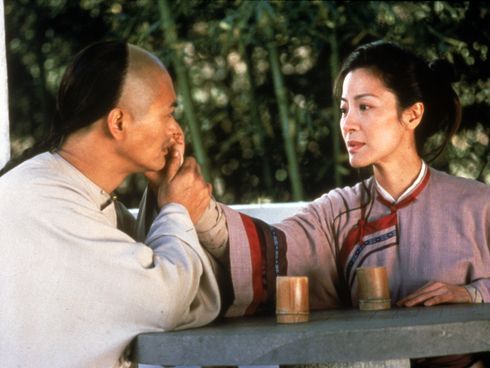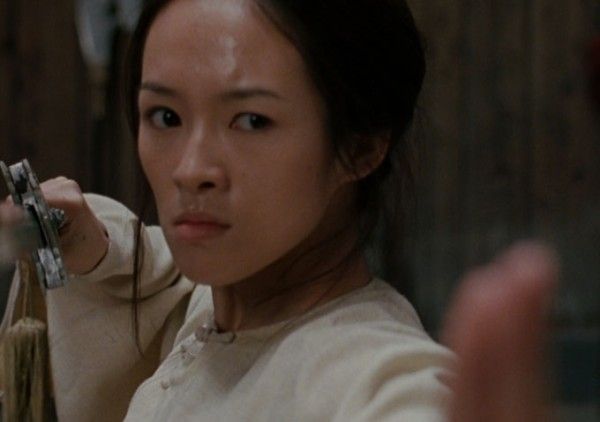Though there's plenty of thrilling, aerial fighting on display in Ang Lee's elegant Crouching Tiger, Hidden Dragon, the main battle of the martial arts spectacle, as it has been in so many Lee films, is one against the rigidity of traditionalism. Like the lovers at the center of Brokeback Mountain or the stranded boy in Life of Pi, the elder heroes of Crouching Tiger, Hidden Dragon, Master Li Mu Bai (Chow Yun-Fat) and Michelle Yeoh's Yu Shu Lien, are bound to a kind of unbearable restraint of their feelings, though their repression is far less physical than being left alone, with a tiger, in a rescue boat in the middle of the ocean. Their ever-apparent desire for one another is the collateral damage they face by adhering to an admittedly barely investigated code of conduct, a way of being that has allowed them to become remarkable, hugely skilled individuals rather than a united, loving couple.
Lee's breakout film will celebrate its 16th anniversary later this year, as well as the release of its sequel at the end of this week on Netflix and in select IMAX screens. As dubious as the concept of a film like Crouching Tiger, Hidden Dragon needing a sequel may seem, the film, entitled Crouching Tiger, Hidden Dragon: Sword of Destiny, and its release on the streaming service reverberate the film's insistence on the need for a break from traditionalism. It's unlikely that the film's production was at all concerned with the fact that the film would be released on a platform that, more than ever, is challenging and changing the traditional modes of film distribution, but this kind of release nevertheless underlines the timelessness of the themes that Lee explores in distinctly personal terms in his film, one of the few foreign-language films to ever be nominated for an Oscar in the Best Picture category.
Lee was born in Pingtung, Taiwan and has described the film as "a dream of China...which probably never existed," and this too speaks to the film's slyly skeptical view of faith and belief. As the film begins, Li Mu Bai is preparing to give up his life as a master swordsman and fighter, which he symbolizes by handing over his Green Destiny Sword, a mighty, mystical weapon which he was gifted by his slain master. It was long his belief that he would use this weapon to kill Jade Fox (Cheng Pei-Pei), the duplicitous warrior who poisoned his master, but the promise of a life with Yu Shu Lien, an enterprising warrior in her own right, is seemingly enough for him. That is, until he sees the possibility of finally fulfilling that prophecy during a visit to the estate of Sir Te (Lung Sihung), where he was expecting to keep his prized sword until it was stolen by a mysterious thief.
It's likely that when Lee was speaking of his "dream of China" that he was more speaking of the gravity defying aerial fights that transpire throughout the film, but there's as much a feeling of the hollowness of what Li Mu Bai has spent his life doing. When he confronts Jade Fox on Sir Te's estate, it's revealed that Li Mu Bai's master used her for sex and would only teach her up to a certain point; this is reiterated when her illiteracy allows for Jade Fox's prized student to betray her. Though Li Mu Bai has risen to an estimable rank of legend due to his adherence to his master's wisdom, that same philosophy and training allowed for Jade Fox to be condescended to and be treated as a lesser due to her sex, and Lee's film is consistently aware of how this kind if disregard breeds understandable bitterness and, ultimately, deceit.
Working from a script by James Schamus, Tsai Kuo Jung, and Wang Hui-Ling, Lee subtly suggests that the legends of great warriors were, and remain, masculine fantasies, but his skepticism does not calcify into pure, simplistic cynicism. Li Mu Bai's belief in the tenants of his master's guide is sincere and has brought him a transcendental kind of peace, even at the expense of a romance with Yu Shu Lien, and its his more modern acceptance and training that has allowed his would-be partner to gain even more skill and confidence as a warrior. And the tales of their heroics, together and apart, is what has influenced Jen (Zhang Ziyi), the seemingly gentile daughter of a nobleman, to learn the same school of fighting and weaponry that Li Mu Bai has mastered. It's the revelation that Jen, who is finally uncovered as the thief who stole the Green Destiny Sword, is the gifted sole pupil of Jade Fox that finally gives the film it's sting, a sense of how even a system meant to bring a being into a state of enlightenment and tranquility can breed an ignorant neglect and a fatal sort of fury that can finally corrupt that same kind of belief.
Jen, ultimately, is Lee's most integral character here, a symbol of a radical upending of the patriarchal beliefs that most myths are built off of. Despite being promised to the son of a nobleman, in the hopes of bettering her father's station in society, a well-paced (and well-placed) flashback shows that Jen has already entered into a heated romance with Lo, aka Dark Cloud, played by the great Chang Chen. In these sequences, it's clear that it's her carnal, lustful hunger that is being slaked, rather than the random sexual desires of a notorious thief and killer. Though she clearly loves him, Lee is sure to make clear that her training, her status as a warrior, is far more important to her than this relationship, a fact that is highlighted by the film's melancholic ending.
The director is equally sure not to give Jade Fox and her myriad duplicitous actions any kind of false purity. Towards the end of the film, the mentor plans to dispatch her pupil through drugs and poison, in an act of revenge for the student holding back essential lessons from Li Mu Bai's master's guide that would have allowed her to progress as a fighter. It might seem cheesy when you think about it, but Lee's ultimate message is the importance of knowledge, of education, in giving both men and women a sense of self-possession and something close to peace. The denial of such things, by Jen, Li Mu Bai, and his master, is what corrodes the bonds between humans and leads to war, both in personal terms and on a global scale. Not for nothing is Lee's film attuned to the violent historical and political shifts in China leading up to the 18th century setting of the film, intimating the corrupted power of the Han Dynasty specifically.
Though the film finally outs itself as a kind of feminist parable, cutting through centuries of masculine-focused tradition, Lee can't help but find romance in the legends and mythology of swordsmen that informs the film. The fight scenes, choreographed by the great Yuen Woo-Ping, who has gone on to direct the upcoming sequel, are utterly sublime, often shot to make great use of the width of the screen, and speak to the tremendous wonder and visceral passions that these kinds of stories aroused in artistic souls like Lee. 16 years on, Crouching Tiger, Hidden Dragon still speaks equally to the modern progressive who can see the hurt and damage that the latent misogyny of legend has imbued society with, and the wide-eyed believer who yearns for and fantasizes about a world where warriors float, fly, and battle against shivering, bucolic landscapes. Jen's final farewell suggests that a new chapter is only now being written, and Crouching Tiger, Hidden Dragon has found its place amongst these very volumes.

